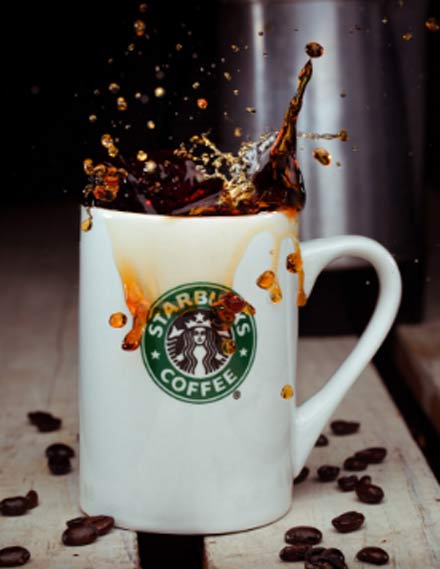I have written elsewhere on these pages about the first Starbucks in Vancouver. Back in the day. 1987, I think it was. March. Their first ever international coffee shop. It was a novelty. And the coffee was good. No, it was great. Remember, even though I was aware that there were human rights abuses throughout the agriculture of coffee beans, I still knew nothing about fair trade, and I continued anyway to enjoy the bitter brew. The baristas were all nice, kind young college dudes, and they seemed to really enjoy what they were doing, as well as liking their regulars. At least they seemed to like me. It was a very convenient stop for me after work, because it was right inside the Waterfront Skytrain Station, former train station, where I liked to pass through on my way to and from work in the Downtown Eastside.
Starbucks, back then, was a pleasant novelty. I never bought their beans, but it was generally a pleasure sitting for an after work brew and a chat with the servers. Of course, they quickly became the gift that went on giving, and I began to make sense of the sinister shadow side that I intuitively discerned about them as they rapidly took over our city, and other cities and soon after, the world. It was a few years later that reports began to come out about the less than ethical sources for their coffee beans. There is this that I just picked up on the internet, from last year:
STARBUCKS COFFEE ON THE “DIRTY LIST”

How do we even know that this is happening? The Brazilian government has taken steps to address forced labor throughout their farming and manufacturing sectors. One of those steps is publishing an annual “Dirty List” of those found in violation of Brazilian law and what they have defined as modern slavery: forced labor, debt bondage, dangerous and degrading conditions, and debilitating work days.
In the fall of 2018, local labor inspectors published reports tying Starbucks to a plantation where workers were forced to work live and work in filthy conditions. Workers reported dead bats and mice in their food, no sanitation systems, and work days that stretched from 6AM to 11PM. Workers reported that the payment system was rigged and the coffee they picked disappeared before it could be tallied. Deductions to cash their checks meant that workers had barely any take-home pay. While the plantation carried Starbucks’ C.A.F.E. Practices certification, Starbucks denied buying from the farm in recent years (C.A.F.E. Practices allow for inspections to happen as infrequently as 2-3 years, depending on several factors including previous inspection scores).
In the more recent case, labor inspectors found workers in similarly dire conditions on another plantation certified to Starbucks’ standards. Overall, the Brazilian labor ministry reports that workers toiling in slavery-like working conditions was at a 15-year high in 2018.
Clearly, there’s a problem. And Starbucks’ C.A.F.E. Practices program is not equal to solving it—or even to bringing the problem to light. It is not their own transparency efforts but those of the Brazilian state that revealed the issues on these farms.
Here is the link if you want to read the entire article.
https://fairworldproject.org/starbucks-has-a-slave-labor-problem/
Naturally, Starbucks soon became the place to go for coffee. They would open up on almost every street corner, rapidly pushing out of business smaller, independent and less wealthy or powerful coffee establishments. They were ruthless and unstoppable. Very quickly I began to boycott Starbucks, because of what they were doing to the business climate of my city, how they were erasing much of our local street culture, how they had come to so emblemize the bland, boring, and mundane. And because I was already suspicious of their human rights practices.
As much as possible I have come to support independent coffee places and only small local chains, especially with an emphasis on buying fair trade wherever possible. In recent years, I do go to Starbucks but on a very limited basis. It has to be based on my work with clients, and it has to be the only viable option for going out for coffee together. Otherwise, we try to go elsewhere.
Starbucks and their huge popularity with the middle class is really symptomatic of a much bigger problem in society. This has to do with consumerism. People for the most part are interested only in whatever gratifies their immediate cravings and desires. No consideration is given to the potential fallout. I have many times tried to talk to people like that about fair trade. In most cases, their eyes would simply glaze over and they would change the subject. Rather like trying to explain calculus to a cat. (Don't even try to explain calculus to me, Gentle Reader!)
No comments:
Post a Comment